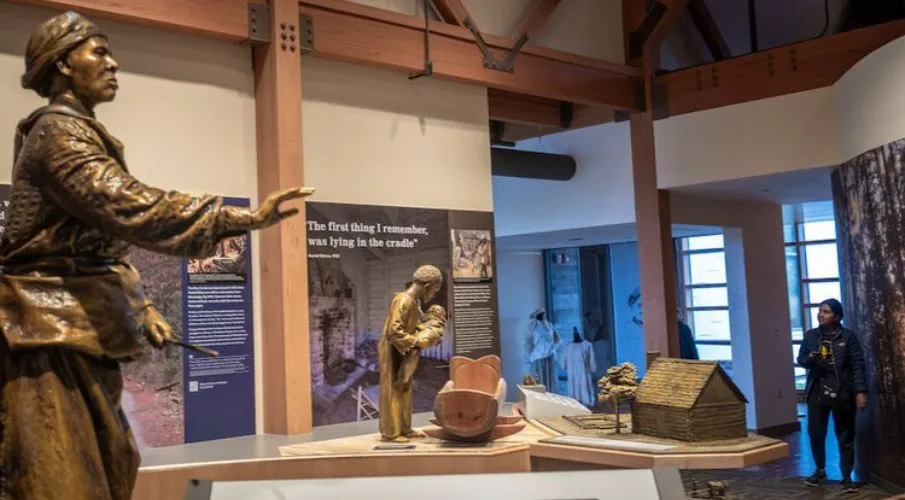The government of Donald Trump is currently reviewing signs, exhibits and even books in the United States’ national parks – with the aim of removing everything that, in its view, “inappropriately disparages” the country. Internal documents leaked to the National Parks Conservation Association mention that material about slavery, the destruction of Indigenous cultures, climate change or industrial pollution must be re-evaluated. The basis is a presidential order that Trump signed in March: public facilities must not contain elements that “inappropriately disparage Americans past or living.” Instead, the presentation should “emphasize the greatness of the achievements and progress of the American people” – as well as the beauty and richness of the landscape. The National Park Service had until July 18 to report allegedly “inappropriate” content. The public was also encouraged to participate. A spokesperson for the Department of the Interior explained that all signs, panels and exhibits would be reviewed and, if necessary, adjusted. Material that does not comply with the order would be removed or covered and reinstalled only after editorial revisions. The government announced it would eliminate all affected content by September 17.

What at first glance sounds like administrative routine has a highly charged political dimension. Among the flagged objects are information panels about air pollution in North Carolina, the consequences of climate change along the coasts, historical portrayals of slavery and the brutality of slaveholders, exhibits about forced assimilation and displacement of Indigenous communities in Alaska or Florida, as well as books naming George Washington as a slave owner. Even the Everglades National Park program, which describes the devastating effects of urbanization and agriculture on the ecosystem, was reported as possibly “disparaging to the development of Industrial America.” The criticism is clear: historians, scientists and civil rights advocates warn of a large-scale rewriting of history. “Pretending that the bad stuff never happened does not make it go away,” says Alan Spears of the National Parks Conservation Association. National parks, he argues, are precisely the places where visitors can learn about the dark sides of history – environmental destruction, slavery, colonial violence. Removing this content deprives people of the opportunity to understand how these problems arose and what they mean for the present.

The NAACP also warns of a white spot on the map of memory: slavery is not a side note but the engine of America’s economic rise for more than two centuries, emphasizes Cedric Haynes, who heads the organization’s policy work. It is crucial to name the perpetrators clearly, because their actions still have an effect today in laws, institutions and wealth. Indigenous voices express similar concerns. In Alaska, panels about the destruction of the language and culture of the Tlingit and other peoples were flagged, and in Florida, portrayals of the internment of Plains Indians. For Brenda Child, professor and member of the Red Lake Ojibwe tribe, it is bitter that precisely now, when a more comprehensive and honest picture of American history is finally being drawn, there is once again an attempt to silence these chapters. “You can try to suppress it, but the cat’s out of the bag. We know what happened. The books are written.”

Particularly explosive is the deletion of climate change and environmental topics. In North Carolina’s Cape Hatteras National Seashore, panels about sea level rise were flagged for review – with the argument that they might distract from the “beauty and abundance” of the landscape. Carlos Martinez of the Union of Concerned Scientists considers this dangerous: national protected areas are the place where the public must be educated about the real dangers to nature and the climate. “If we remove this information, we take away the ability of the next generation to grasp what is at stake – and to get involved.” Even in the Everglades, one of the most iconic protected areas in America, the descriptions of environmental destruction are at risk. For decades, agriculture and urbanization had carved up the ecosystem before the park was established in 1947. Today, a gigantic restoration project is underway, approved by Congress with bipartisan support. Eve Samples, director of Friends of the Everglades, warns: “If we erase these mistakes of the past, we are doomed to repeat them.”
The debate about the national parks thus becomes a mirror of the political confrontation in the United States. It is not just about signs and books, but about the collective memory of a nation. The question is whether America will confront its children with the whole truth – or whether it will retreat into a polished self-image that only deepens the conflict with reality.
Investigative journalism requires courage, conviction – and your support.
Please support our journalistic fight against right-wing populism and human rights violations. We do not want to finance our work through a paywall, so that everyone can read our investigations – regardless of income or background.

Unglaublich!
Das gibt keinen breiten Aufschrei? All die indigenen Völker? Black live Matters? Marching Luther King Foundation?
Es soll die Geschichte umgeschrieben werden.
Alle Gräueltaten der Kolonialisierung der USA getilgt werden.
Die Indigenen werden erneut verleugnet.
Die Sklaverei wird als „positiv“ deklariert. Weil ja „die dummen Wilden“ ihre Fähigkeiten aufbauen konnten, dank ihrer „großzügigen Sklavenhaltern“.
Und von der Verleugnung von Umweltverschmutzung Und Klimawandel kommen noch oben drauf.
Aber Hauptsache man hat einen Nachbau der Arche Noah …. natürlich sind Noah Und seine Familie „schneeweiß“ und züchtig gekleidet 🤣 genau gegenteilig zu antropologischen und geschichtlichen Nachweisen.
Ich bin froh, dass ich die Nationalparks noch ohne die Zensur gesehen habe. Ebenso die Museen.
Hoffentlich gibt es mutige Menschen, die all diese wichtigen Errungenschaften retten.
…doch, die menschen toben und es bewegt sehr viel dagegen
Danke für die Info.
Hier hört man nichts
Auch nicht wirklich bei ACLU
CNN, ABC etc